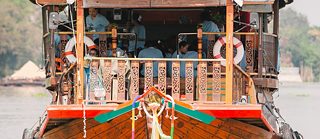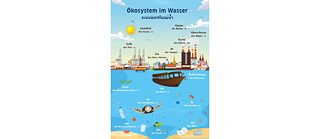Education for sustainable development
Learning German on the Chao Phraya

Water pollution doesn't concern me? No one can say that after the river trip on the Chao Phraya. The Goethe-Institut Thailand invited seven schools to get their own impression of the river's water quality and to better understand why environmental problems also affect their own environment.
Sunshine galore, hardly any rain, high temperatures. March is a good month for trips in Thailand. Since the pandemic rules of 2021 finally allowed it again, the Goethe-Institut Bangkok took the opportunity to offer a very special river trip on the Chao Phraya for 41 participants and seven teachers from all over the country. Finally out in the open again, finally real encounters! With this project, the Institute wants to combine German language learning with sustainable action and sensitize the participants to environmental issues related to water.
Education for sustainable development in language teaching
Since 2018, the Goethe-Institut Thailand's German Education Cooperation has been committed to sustainability and education for sustainable development (ESD) in its projects. Students are regularly sensitized to sustainability issues via workshops and playful exercises. The river trip on the Chao Phraya was intended to make the young people aware of the environmental hazards along the river and the living conditions of the riverbank inhabitants, while at the same time allowing them to experience the German language outside their classrooms. The expertise on environmental issues was brought in by the partner Traidhos Three-Generation Barge Program, which was literally brought on board for the project.On the way on the Chao Phraya
The Chao Phraya is one of Thailand's largest and most important rivers. It is an important traffic artery and, with its many canals (khlongs), also serves to irrigate the rice-growing areas. Many therefore refer to it as the "main artery of Thailand". It stretches from the north of the country to Bangkok and flows into the Gulf of Thailand.Participants from seven Thai schools took a traditional wooden boat from Bangkok via the historic city of Ayutthaya with its impressive Buddhist temples to Piyawan Resort, where the group stayed overnight.
Along the Chao Phraya basin, about 30,000 factories have settled and are the main culprit for the pollution of the water body. The closure of numerous small canals due to increasing urbanization is also causing more flooding.
During the boat trip, the groups role-played to develop plans for using a wetland. They observed how the people of the immediate river environment live: Some bathe in the river, others sell food on their boats. Students* were able to examine the water themselves and learned why water hyacinths, for example, are an indicator of water quality. "All of this helped the students* understand the impact their own actions have on the environment," reports Prewsulee Nikrothanon, a Goethe-Institut teacher who accompanied the field trip. "The role plays are meant to create awareness of the different stakeholders - residents, rice farmers, factories, politicians - who all rely on the river water." At Piyawan Resort, a language camp with playful activities awaited the young people on the second day: They interviewed each other in German about their everyday use of water and discussed ways to save water. In an upcycling workshop, they learned how to make chic bags from old T-shirts. Along the way, the students learned all the important vocabulary about sustainability, which they recorded in a workbook (see picture gallery).
Connection to everyday school life
"Water is important everywhere - even in the schools themselves," explains project coordinator Prasanee Sinlapanawin (Miao). Even before the camp, the young people identified specific water-environment issues in their hometowns that also directly affect the schools. During the camp, they then came up with specific solutions and actions. This exercise helped the youth make the connection between their home and the SDGs (Sustainable Development Goals) and how a water problem can affect the economy, social issues, and people's well-being.Combining ESD with German language learning is a concept that the Goethe-Institut Thailand will continue to pursue in the future. Various projects for sustainable thinking and action are being planned and will be released soon.











